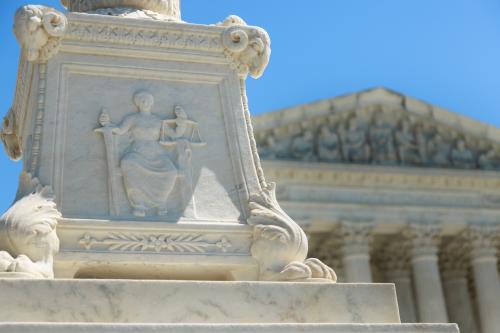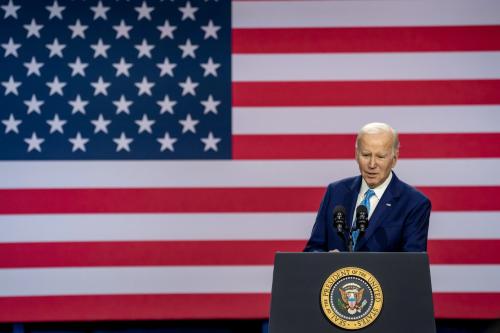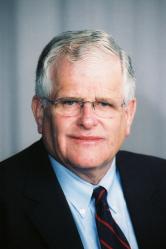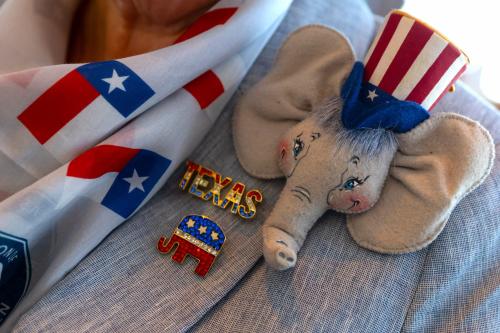Recent revelations of Justice Clarence Thomas’s rocky relationship with gift and income reporting rules have heightened attention to the arcane and often misunderstood federal judicial ethics regime and quickened the drumbeat for a Supreme Court code of conduct. My goal in this post is to (1) summarize the statutes and rules that govern federal judge’s and justices’ acceptance and reporting of gifts, (2) assess Justice Thomas’s compliance and (3) review the responses to Thomas’s case and broader calls for tightened judicial ethics enforcement — principally the feasibility of policing alleged violations through a Supreme Court code of conduct.
Controversy over Justice Thomas is one of many swirling about the Court. Claims, vigorously denied, of a leaked 2014 opinion and private efforts to curry favor with some justices; controversy around the investigation of the leaked opinion in last year’s abortions case; and numerous controversies about Justice Thomas’s spouse are an incomplete list.
1. Federal judicial ethics regulations
The gift and reporting rules at issue in Thomas’s case are part of the larger web of sometimes arcane federal judicial ethics statutes and advisory guidelines. They include the disqualification statute, which governs all federal judges; the judicial complaint statute, which governs lower court judges only; and the Judicial Conference’s advisory Code of Conduct for United States Judges, which is directed at lower court judges, although the justices say they consult it.
a. Gifts and their disclosure
Another set of statutes involve tangible things that justices, judges and other officials may earn or receive beyond their judicial salaries — investments, outside employment, gifts, for example — and what they must disclose.
Congress has also designated offices within the branches to receive disclosure reports and issue regulations implementing the statutes. That office for the judiciary is the Judicial Conference of the United States, the 26-judge body, over which the Chief Justice presides, that makes administrative policy for the federal courts. Its Committee on Financial Disclosure receives disclosure reports and writes regulations on gifts, outside income and financial reporting.
The two principal statutes most relevant to the Thomas situation are:
- The 1978 Ethics in Government Act is a wide-ranging post-Watergate, anti-corruption statute. One provision directs government officials, including justices and judges, to report annually “all gifts [above a certain amount] received from any source other than a relative. . ., except that any food, lodging, or entertainment received as personal hospitality of an individual need not be reported.” The “personal hospitality” phrase is key to the Thomas controversy.
- The 1989 Ethics Reform Act seeks to reduce conflicts of interest, in part by barring government officials, including justices and judges, from “accept[ing] anything of value from a person . . . seeking official action from the individual’s reporting entity [or] whose [financial] interests may be substantially affected by the performance or nonperformance of the individual’s official duties.” Conference regulations specify that “anything of value” includes most “gifts,” but they exclude various items from the definition of a “gift”, including “social hospitality based on personal relationships.”
b. Judges covered
These statutes and rules apply to federal judges and to the Supreme Court justices and have done so since their enactment — not starting this year, as misreported by a national news source’s editorial and its weekly news quiz.
First, the statutes apply to members of Congress and “officer[s and] employee[s]” of all three branches; they do not exclude supreme court justices. Second, the Conference’s financial reporting regulations include the justices by defining them as covered “judicial officer[s].”
But the regulations on gifts and outside income exclude justices from their definitions of “judicial officer.” Instead, those regulations delegate to the Chief Justice the Conference’s administrative and enforcement authority as to the Court. In 1991, the justices by resolution agreed to comply with the “substance of” the gift and outside income regulations. In his “2011 Year-End Report,” Chief Justice John G. Roberts, Jr., said that the justices “[f]or purposes of sound administration,” file their annual financial disclosure reports with the Judicial Conference Financial Disclosure Committee, and, referencing the 1991 resolution, “agreed to follow the [gift and outside income] regulations as a matter of internal practice.”
Misunderstandings about the rules abound. Another mistake in the editorial referenced above, for one example, was a claim that the chief justice “has repeatedly said” the gift regulations “don’t apply to the Supreme Court” — a woefully imprecise statement that appears to confuse the lower courts’ advisory code of conduct with the gift and reporting rules that the justices say they have agreed to follow. (The Court is by-and-large administratively autonomous from the rest of the federal judiciary; these rules are one of the few exceptions.)
c. Enforcement
Enforcement mechanisms in the 1978 Ethics in Government Act come into play for individuals who “willfully failed to file a report or . . . willfully falsified or willfully failed to file information required to be reported” under the Act. The relevant provisions authorize the Justice Department to bring civil actions against such a person. They also direct various agencies, including the Judicial Conference, to report such individuals to the department if they have “reasonable cause to believe” the individuals willfully falsified or failed to file required reports.
2. Justice Thomas
The current revelations about Justice Thomas first appeared on April 6. They report that Harlan Crow, a politically active Texas real estate developer, entertained the justice and his wife for many years on expensive vacations to various domestic and international venues, including on the developer’s boats and planes. Thomas did not report these trips on his annual financial disclosure forms. Critics say that a justice’s accepting of such lavish gifts over many years is at least unseemly and that Thomas was legally obliged to disclose them.
On April 7, a day after the first news article appeared, Thomas justified his failure to report the trips:
“Early in my tenure at the Court, I sought guidance from my colleagues and others in the judiciary, and was advised that this sort of personal hospitality from close personal friends, who did not have business before the Court, was not reportable. I have endeavored to follow that counsel throughout my tenure, and have always sought to comply with the disclosure guidelines. These guidelines are now being changed, as the committee of the Judicial Conference responsible for financial disclosure for the entire federal judiciary just this past month announced new guidance. And, it is, of course, my intent to follow this guidance in the future.”[1]
The changed guidance to which he refers are March 2023 revisions to the financial reporting regulations. They now define “personal hospitality of any [sic] individual” — the 1978 Act’s description of gifts that judges need not report. The director of the Administrative Office of U.S. Courts said that the revised “guidance . . . clarifies” what items are exempt from reporting. Such personal hospitality is non-business hospitality at the host’s residence or personal property. Hospitality that judges and justices need not report include only “food, lodging, or entertainment.” The exemption does not include “gifts . . . such as transportation that substitutes for commercial transportation” (such as a host’s private plane).
The April 7 statement raises numerous questions, including:
- Did the fact that the Conference tightened the reporting guidelines mean that the regulations in place earlier did not require disclosure? The same editorial cited above said that “[h]ad the [March 2023] rules been in effect earlier, [Thomas] would have had to disclose the trips he took.” That assumes that Thomas was not obligated to disclose his trips under the pre-March statutory and regulatory regime. Two watchdog groups, however, here, and here explain that the Ethics in Government Act and the judicial branch regulations have always required disclosing gifts of transportation.
- When “early in his tenure” did he seek guidance (he joined the Court in October 1991) and about what specific hospitality did he seek it? Did early “guidance” that a modest bit of hospitality could go unreported become a ticket for not reporting much more elaborate gifts provided later in his tenure, gifts that stretch the definition of “personal hospitality of an individual” and “social hospitality based on personal relationships”?
- How vigorously did he seek guidance and which “others” provided it? The Conference’s Codes of Conduct Committee issues advisory opinions — technically only to judges to whom the code “applies” but justices also seek opinions. The Conference authorizes the committee to issue opinions on the code and on some statutory provisions. Thomas might have received guidance from the committee on the 1989 Ethics Reform gift provisions but not the Ethics in Government Act’s “personal hospitality” gift exception (the Administrative Office director’s letter explained that the committee has no authority to issue opinions on that term).
- Did he consider at some point the Code of Conduct for United States Judges (beyond the code’s admonition to obey the gift statute and regulations (Canon 4 D (4))? One possibly relevant, if obvious, admonition says judges should not “convey or permit others to convey the impression that they are in a special position to influence the judge” (Canon 2 and Commentary). Such an impression might have been conveyed to others who joined the trips that Crow funded. Overzealous adherence to that guidance could rule out standard, non-controversial interactions that many judges have, but the extent and frequency of Crow’s hosting of Thomas could bring the admonition into play.
3. Controversies and Proposals in the Wake of the Revelations
The flap over Crow’s gifts to Thomas have produced demands for Justice Department investigations of Thomas and broader calls for changes to the Supreme Court ethics regime.
a. Investigating Thomas
As noted above, two watchdog groups (here and here) have asked the department to bring actions against Thomas under the enforcement mechanisms described earlier. Department action seems highly unlikely, mainly because the “willfully falsified or failed” standard creates a high bar. And no doubt the department wants to avoid an investigation that critics would label as an effort to silence a member of the Court’s conservative majority.
On the legislative front, Senate Judiciary Committee Democrats asked Chief Justice Roberts to investigate the Thomas matter, and subcommittee chairs Senator Sheldon Whitehouse (D-RI) and Representative Hank Johnson asked the Judicial Conference to refer Thomas to the Justice Department, as has another watchdog group.
The Administrative Office director (who is also the Conference secretary) referred the requests to the Financial Disclosure Committee, which exercises the Conference’s statutory duty to assess whether judges’ disclosure forms comply with the rules. (News headlines that Chief Justice Roberts “punt[ed]” by referring a request that he investigate Thomas to the Conference reflects apparent ignorance of the statute.) In any event, it seems highly unlikely that a group of lower court judges, at least based on available evidence, will find “reasonable cause to believe” that Thomas “willfully” violated the statute. Had the statute set a lower bar — such as negligently failed to report covered gifts — the judges would be in more of a quandary.
b. Increased contentiousness
The Thomas matter has also prompted broader investigations and calls for changes to the ethics regime, in particular calls for a Supreme Court code of conduct. These calls are occurring in a period of increased legislative-judicial contentiousness. The Senate Judiciary Committee has scheduled a May 2 hearings on Supreme Court Ethics Reform and on April 20 invited Chief Justice Roberts or a designee to testify. Roberts declined on April 25, citing precedent and unspecified “separation of powers” and “judicial independence” concerns. But he attached a “Statement on Ethics Principles and Practices,” signed by all nine justices. The two-plus-page statement — seemingly in response to the darkening storm over the Court but with no reference to it — summarizes ethics statutes, rules, and guidance. It has satisfied few critics but has served as a prop for those defending the Court.
The justices’ statement brought an April 27 response from committee Democrats, requesting that Roberts provide in advance of the May 2 hearing, answers to five questions about the statement, such as the date on which the justices subscribed to it.
c. A code of conduct for the Court?
The Thomas revelations have quickened calls for the Court to adopt a code of conduct or for Congress either to require it to do so or to impose one. The justices have been discussing the idea [see p. 98] since 2019 but apparently cannot reach consensus. Nothing in the April 2023 statement suggests otherwise.
Calls for a Supreme Court code of conduct have been around at least since the 2011 legislation introduced by then-Representative Christopher Murphy (D-Conn.). They have proliferated since, and especially once the Thomas story broke. On that day, for one example, Senator Chris Van Hollen (D-Md.), chair of the Senate appropriations subcommittee of jurisdiction, said he would “use the appropriations process to ensure that the Supreme Court adopts a code of conduct similar to that which applies to other members of the federal bench” i.e., the aforementioned Code of Conduct for U.S. Judges. Others, apparently recognizing that the current code is not self-enforcing, have called, as did Senator Corey Booker (D. N.J.), for “a binding, enforceable code of conduct for the Supreme Court.” Several bills have been introduced to do that — create or require a code and create an enforcement mechanism (e.g., have chief circuit judges review complaints of violations or create a Court Ethics Investigation Counsel — or designate “an individual . . .to process complaints”. (The latter bill, filed by Senators Angus King (I-Maine), and Lisa Murkowski (R-Alaska) is the first of the recent bills not exclusively Democratic-legislator-sponsored).
Whatever the content of such codes, as ethics codes, they will likely be, by and large, more guidelines than enforceable regulations. Some admonitions in the federal courts’ code are specific — don’t belong to groups that practice invidious discrimination, for example, or don’t use judicial chambers, resources, or staff to a “substantial degree” even for permitted extrajudicial activities. The code itself acknowledges, however, that “[m]any of [its] restrictions are necessarily cast in general terms, and judges may reasonably differ in their interpretation” — for example, judges “should dispose promptly of the business of the court” and “not be swayed by partisan interests, public clamor, or fear of criticism.” Whatever the many weaknesses of the Court’s April 23 statement, its claim that the code’s canons are “far too general to be used” as “rules” is generally on point.
In that regard, note the Model Code of Conduct for U.S. Supreme Court Justices. proposed in March 2023 by the Project on Government Oversight. POGO vigorously promotes government ethics (it requested the Justice Department to investigate Justice Thomas’s disclosure reports). Its model code expands and modifies the current code for lower court judges but beefs it up by, for example, substituting “shall not” for “should not” in its admonitions, encouraging justices’ close family members to avoid political activity that could appear to compromise a justice’s impartiality, and discouraging not recusing simply because doing so would produce a four-four tie vote in a litigation.
Tellingly, though, with respect to the immediate problem at hand — accepting gifts that shouldn’t be accepted and not reporting gifts that should be reported — the Model Code simply repeats verbatim the admonition in the current code: judges should “comply with the restrictions on acceptance of gifts and the prohibition on solicitation of gifts set forth in the Judicial Conference Gift Regulations” and seek to have family members do the same. The POGO code, on the matter now at the heart of the current controversy, did not try to write rules.
(All this is not to say that the Court should not adopt a code of conduct. It should, as a tangible demonstration that the justices take ethics obligations seriously. A well-designed code could — as the preface to POGO’s model code claims its code would — “give the public a clear barometer of whether a justice’s conduct is within ethical bounds.” That’s a reasonable statement — after inserting “sometimes” before the word “clear”.
The hard question is not whether the Court should adopt an aspirational code. The hard question is how to enforce clear standards of ethical conduct.
Summing Up
The Court’s standing in the public’s eye is low by comparison to other institutions and historically. Some of that low regard reflects disagreement with judicial decisions. But at least some of it reflects concern over the extrajudicial controversies the court faces.
What is not clear is whether the justices as individuals fully appreciate the seriousness of the situation created by recurring reports of behavior that violates, or comes close to violating, requirements established by Congress.
[1] Other reporting said that Crow bought Georgia property from Thomas at above-market value, a deal that Thomas failed to disclose as required. He will apparently amend his disclosure forms to reflect that purchase. Other reports on the heels of the Thomas revelations concerned Justice Neil Gorsuch’s failure, after his appointment to the Court, to disclose that the purchaser of some of his Colorado property was the head of a law firm that frequently argues before the Court (a failure that didn’t violate disclosure rules but that some say illustrates the need for tighter rules).
-
Acknowledgements and disclosures
Thanks to Amanda Frost (University of Virginia, School of Law) and Arthur Hellman (University of Pittsburgh, School of Law) for comments on an earlier draft.







Commentary
Justice Thomas, gift reporting rules, and what a Supreme Court code of conduct would and wouldn’t accomplish
May 1, 2023